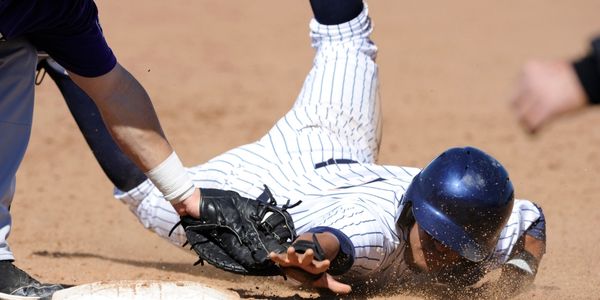Overcoming Fear After Injuries
There are many distracting thoughts that can negatively affect a hitter’s swing and detract from his performance (fear of failing, past at-bats, slumps, comments from coaches).
There are also some thoughts that a hitter may not be consciously aware of that can dramatically affect his mechanics and offensive production.
Past injuries can unconsciously affect a hitter’s mechanics and the fluidity of his swing.
A hitter may respond to a past injury by trying to “protect” the arm from further injury and unconsciously alter his swing.
Mark Teixeira, New York Yankees slugger, has been attempting to rebound from a wrist injury that caused him to miss the majority of the 2013 season.
The first baseman watched the game film with Yankees hitting coach Kevin Long.
The images were striking: When Teixiera swung left-handed he was not taking a full swing.
He was releasing the bat right at contact, inhibiting his ability to drive the ball. Subconsciously, the wrist was impeding simple mechanics.
Teixiera struggled at the beginning of the 2014 Spring Training hitting .086 (3-35) with 11 Ks and only one extra base hit.
After a video session with hitting coach Kevin Long, Teixiera realized he altered his swing due to his injury:
“I was protecting my swing the way I was doing last year when I was hurt. I think it’s just the bad habits I got into last year… It was unbelievable how early I was letting go of my (left) hand to protect the (right) wrist, just really a bad mechanical thing.”
Teixeira believes he can overcome this mental obstacle.
“Lefthanded, mentally I have to continue to remember that it’s [his wrist] healthy now and even though it might be a little bit tight, and every now and then it’s a little bit sore, I can still take that full swing.”
Layoffs caused by injuries interrupt your daily routine and motor memory.
Returning from injury will require some extra attention to ensure that you are in optimal form.
Make sure you are 100% healed and cleared to go back to ball before you work on your swing mechanics- so you do not compensate or protect the injured area.
You should make sure that your swing mechanics are sound and well-learned through repetition. By having sound mechanics, you will not over-think your swing in the batter’s box.
I suggest that you work to improve your at-bat routine to help you mentally prepare the same way before each at-bat.
Your routine will help you focus and trust your swing for the current pitch.
Use you routine to relax between pitches (deep breathes, shrugging shoulders, etc.).
Tense muscles interfere with a fluid swing and increase the chances of re-injury.
Sign Up For A Free Baseball Mental Game eBook!
Related Sports Psychology Articles
- How To Play Confidently Following An Injury
- Derek Jeter and Fear of Re-injury
- How Ball Players Become Resilient Through Adversity
*Subscribe to The Sports Psychology Podcast on iTunes
*Subscribe to The Sports Psychology Podcast on Spotify
Get the Mental Edge – With Mental Toughness Coaching
Mental toughness coaching helps serious athletes like you uncover the beliefs and attitudes that keep you from performing to your potential. You’ll learn mental game strategies to perform confidently in competition and how to overcome performance barriers.
You can improve your mental game with Mental Game Coaches, Dr. Patrick Cohn and Jaclyn Ellis, M.S. You can opt for one-on-one sessions with Dr. Cohn in Orlando, Florida, or you can stay where you are and get coaching from anywhere in the world via telephone, Skype, Zoom, or FaceTime.
One-on-one mental coaching is the fastest and most effective method to improve your mental game, boost your performance, and make lasting changes. We have a variety of mental coaching programs to choose from.
Please call us at 888-742-7225 with your questions.

